HVAC Companies Newlyn
Best HVAC Companies in Newlyn
Receive multiple HVAC Contractor quotes for your project today! Compare profiles, reviews, accreditations, portfolio, etc... and choose the best offer.
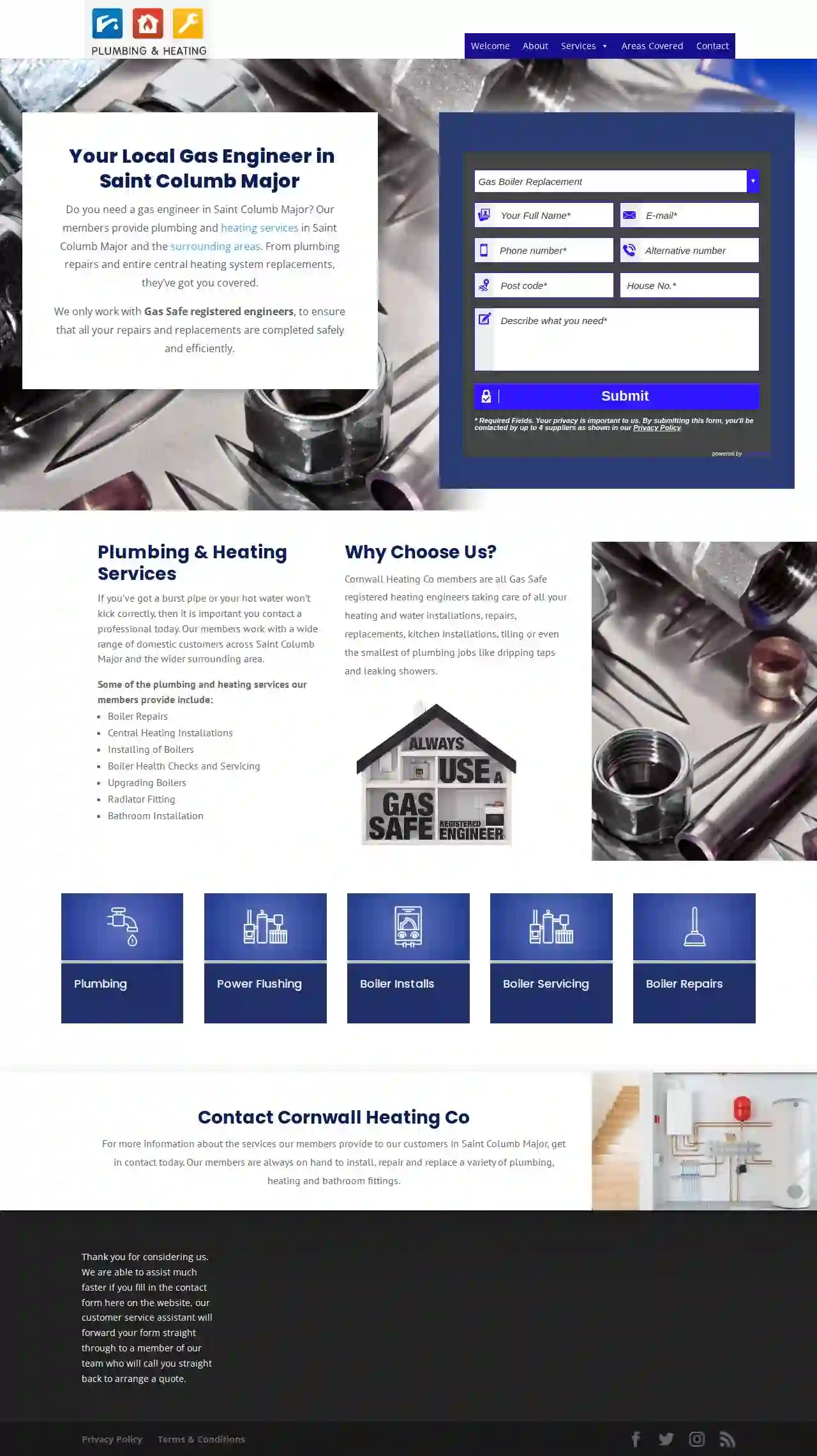
Gas Install Ltd - Gas Installation Services in Cornwall
51 reviewsTruro, GBCornwall Heating Co members are all Gas Safe registered heating engineers taking care of all your heating and water installations, repairs, replacements, kitchen installations, tiling or even the smallest of plumbing jobs like dripping taps and leaking showers. We only work with Gas Safe registered engineers, to ensure that all your repairs and replacements are completed safely and efficiently. If you’ve got a burst pipe or your hot water won’t kick correctly, then it is important you contact a professional today. Our members work with a wide range of domestic customers across Cornwall and the wider surrounding area. Some of the plumbing and heating services our members provide include: Boiler Repairs, Central Heating Installations, Installing of Boilers, Boiler Health Checks and Servicing, Upgrading Boilers, Radiator Fitting, Bathroom Installation.
- Services
- Why Us?
- Gallery
Get Quote
Blue Flame Heating Solutions
4.256 reviewsPenryn, GBAward-winning heating, renewables and electrical support for the people and businesses of Cornwall. Our friendly team is on hand to help with all your heating, plumbing and electrical needs. Whether it's fixing a broken boiler or helping you save money on your energy bills, we're here to help. We work with over 12,000 customers and help them to: Stay safe, Stay warm, Save money, Focus on the important things in life.
- Services
- Why Us?
- Accreditations
- Our Team
- Testimonials
- Gallery
Get Quote
BlueBurn
513 reviewsGoonhavern, TR4 9NW, GBWelcome to Blueburn, a fully qualified domestic gas engineer based in Goonhavern, covering the surrounding areas, Mid to West Cornwall, covering Penzance to Bodmin. With 18 years of experience working for British Gas, specialising in service and repair, I offer all aspects of domestic gas services, from boiler installation to service and diagnostic repairs on boilers, fires, cookers and heating systems. I have a range of options available for boiler services and repairs, including emergency breakdown repairs, annual servicing, one-off servicing and safety checks for landlords. I can carry out full central heating installations, boiler installs and upgrades, and install and repair all LPG and Gas home appliances such as ovens, cookers, hobs, gas fires, and water heating systems.
- Services
- Why Us?
- Our Team
- Gallery
Get Quote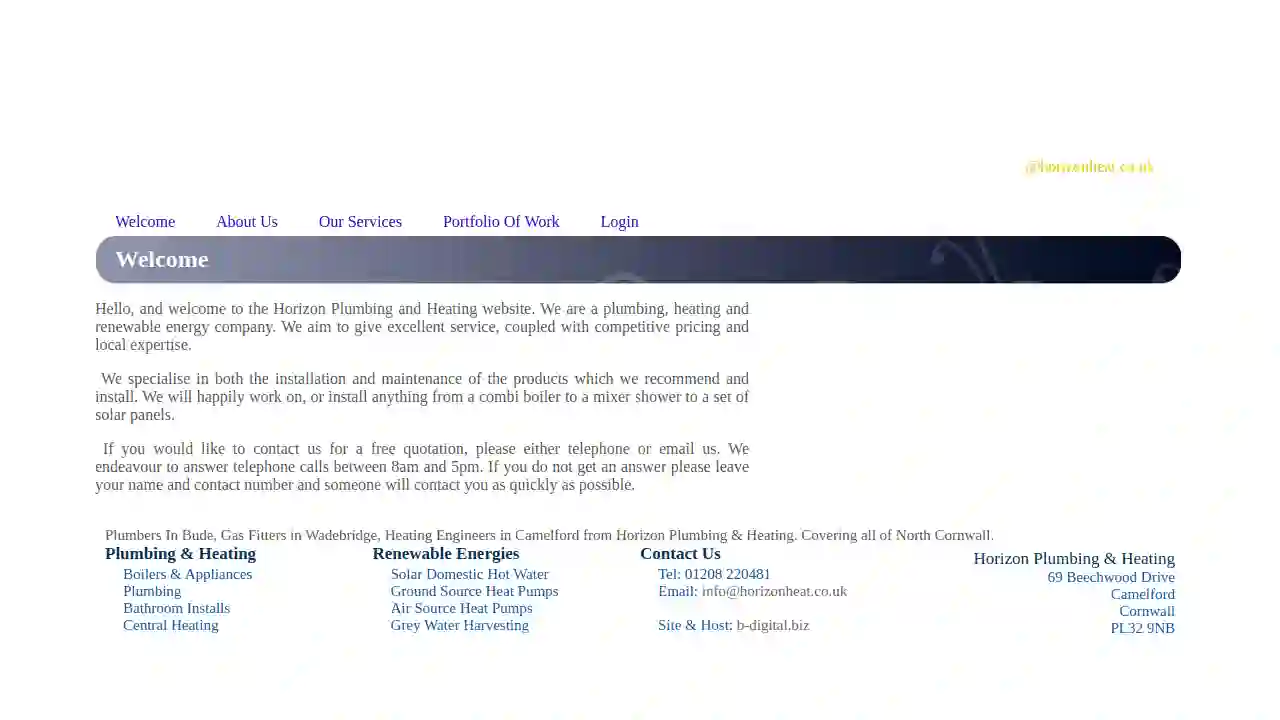
Horizon Plumbing & Heating
52 reviews69 Beechwood Drive, Camelford, PL32 9NB, GBHello, and welcome to the Horizon Plumbing and Heating website. We are a plumbing, heating and renewable energy company. We aim to give excellent service, coupled with competitive pricing and local expertise. We specialise in both the installation and maintenance of the products which we recommend and install. We will happily work on, or install anything from a combi boiler to a mixer shower to a set of solar panels. If you would like to contact us for a free quotation, please either telephone or email us. We endeavour to answer telephone calls between 8am and 5pm. If you do not get an answer please leave your name and contact number and someone will contact you as quickly as possible. Plumbers In Bude, Gas Fitters in Wadebridge, Heating Engineers in Camelford from Horizon Plumbing & Heating. Covering all of North Cornwall.
- Services
- Why Us?
- Gallery
Get Quote
Genev-Air (Eco Heating & Cooling)
58 reviewsTruro, GBGenev-Air provides eco-friendly heating and cooling solutions for homes and businesses in Cornwall and Plymouth. We specialize in air to air heat pumps, offering installation, service, and maintenance. Our team is dedicated to helping you create a comfortable and energy-efficient environment. Why choose air to air heat pumps? Efficient and effective heating and cooling in any room Reduces energy bills and provides a low carbon footprint Improves air quality by reducing dust, pollen, and moisture Creates a comfortable environment for a sound night's sleep Ideal for businesses, loft conversions, mobile homes, static caravans, and the home Customer Feedback "Fantastic! Our conservatory is now cool in the summer and warm in the winter" "Air Conditioning in the bedroom has been amazing this summer. Many thanks Mark"
- Services
- Why Us?
- Our Team
- Testimonials
- Gallery
Get Quote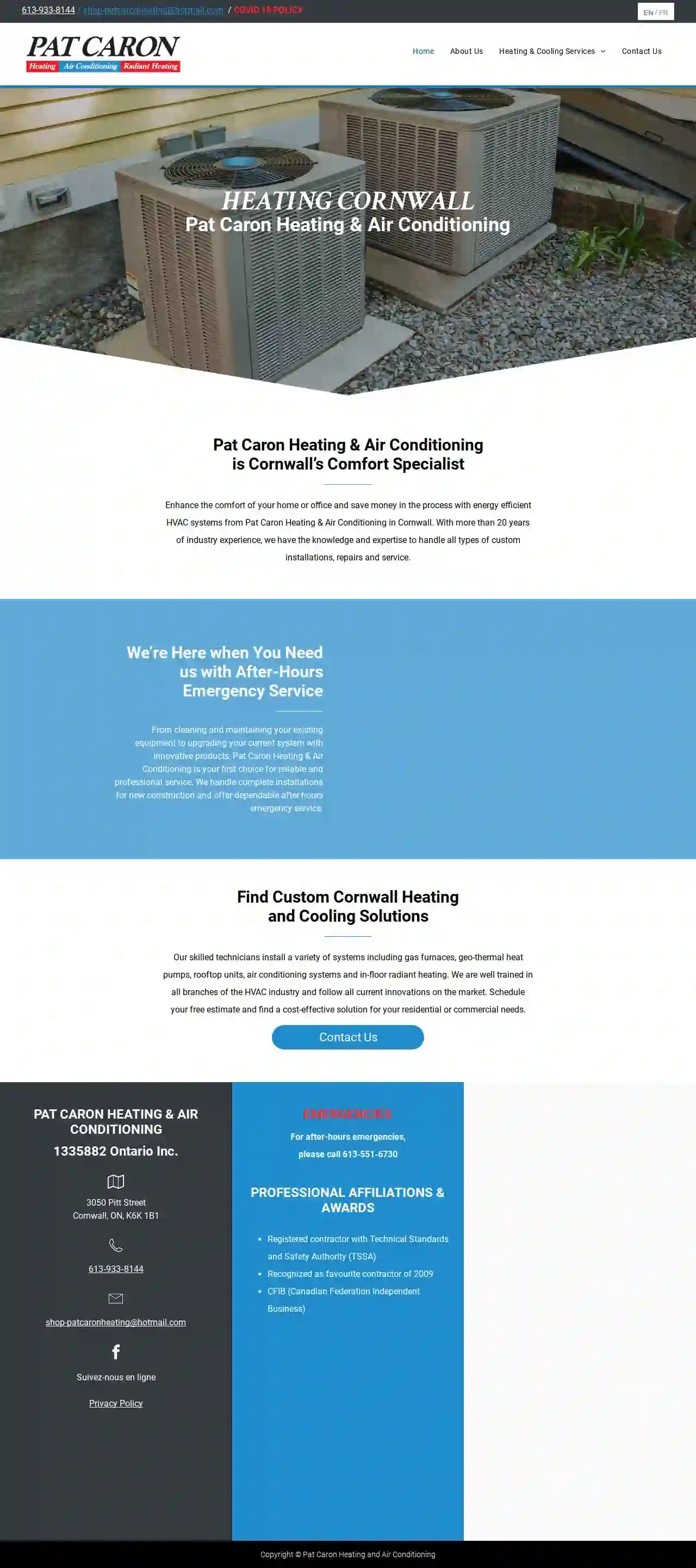
Pat Caron Heating and Air Conditioning | Heating Cornwall
415 reviews3050 Pitt Street, Cornwall, K6K 1B1, GBPat Caron Heating & Air Conditioning is Cornwall's Comfort Specialist. Enhance the comfort of your home or office and save money in the process with energy efficient HVAC systems from Pat Caron Heating & Air Conditioning in Cornwall. With more than 20 years of industry experience, we have the knowledge and expertise to handle all types of custom installations, repairs and service. We're Here when You Need us with After-Hours Emergency Service. From cleaning and maintaining your existing equipment to upgrading your current system with innovative products, Pat Caron Heating & Air Conditioning is your first choice for reliable and professional service. We handle complete installations for new construction and offer dependable after-hours emergency service. Our skilled technicians install a variety of systems including gas furnaces, geo-thermal heat pumps, rooftop units, air conditioning systems and in-floor radiant heating. We are well trained in all branches of the HVAC industry and follow all current innovations on the market. Schedule your free estimate and find a cost-effective solution for your residential or commercial needs.
- Services
- Why Us?
- Accreditations
- Gallery
Get Quote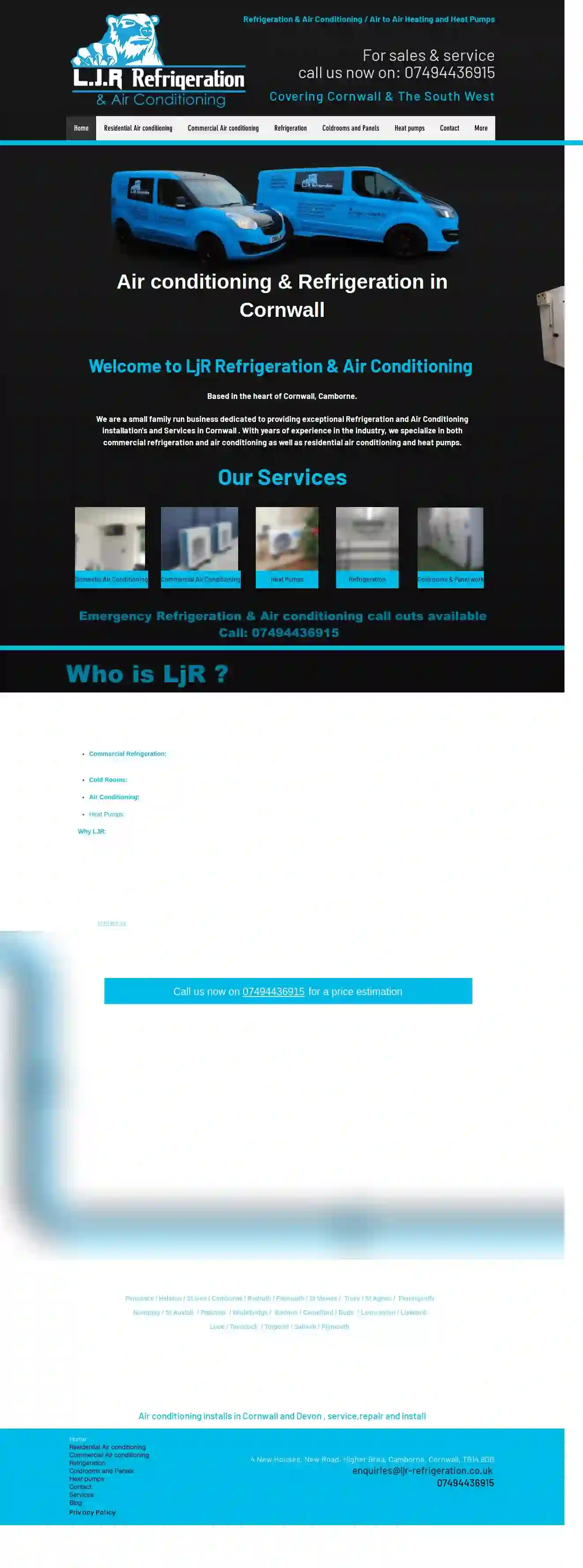
LJR Refrigeration and Air conditioning Cornwall
4.727 reviewsNew Road, Higher Brea, 4 New Houses, Camborne, TR14 9DB, GBBased in the heart of Cornwall, Camborne, we are a small family run business dedicated to providing exceptional Refrigeration and Air Conditioning installation's and Services in Cornwall. With years of experience in the industry, we specialize in both commercial refrigeration and air conditioning as well as residential air conditioning and heat pumps. We've been around the cooling block, tackling all sorts of situations. Experienced? You bet. We're not a big company; we're a family outfit. Expect personal service and a friendly approach – that's just how we roll. We aim to make things easy for you. No fancy jargon, just straightforward service that keeps you happy. Cornwall is where we call home. Supporting local is in our DNA, and we're here to make sure our neighbours stay cool.
- Services
- Why Us?
- Gallery
Get Quote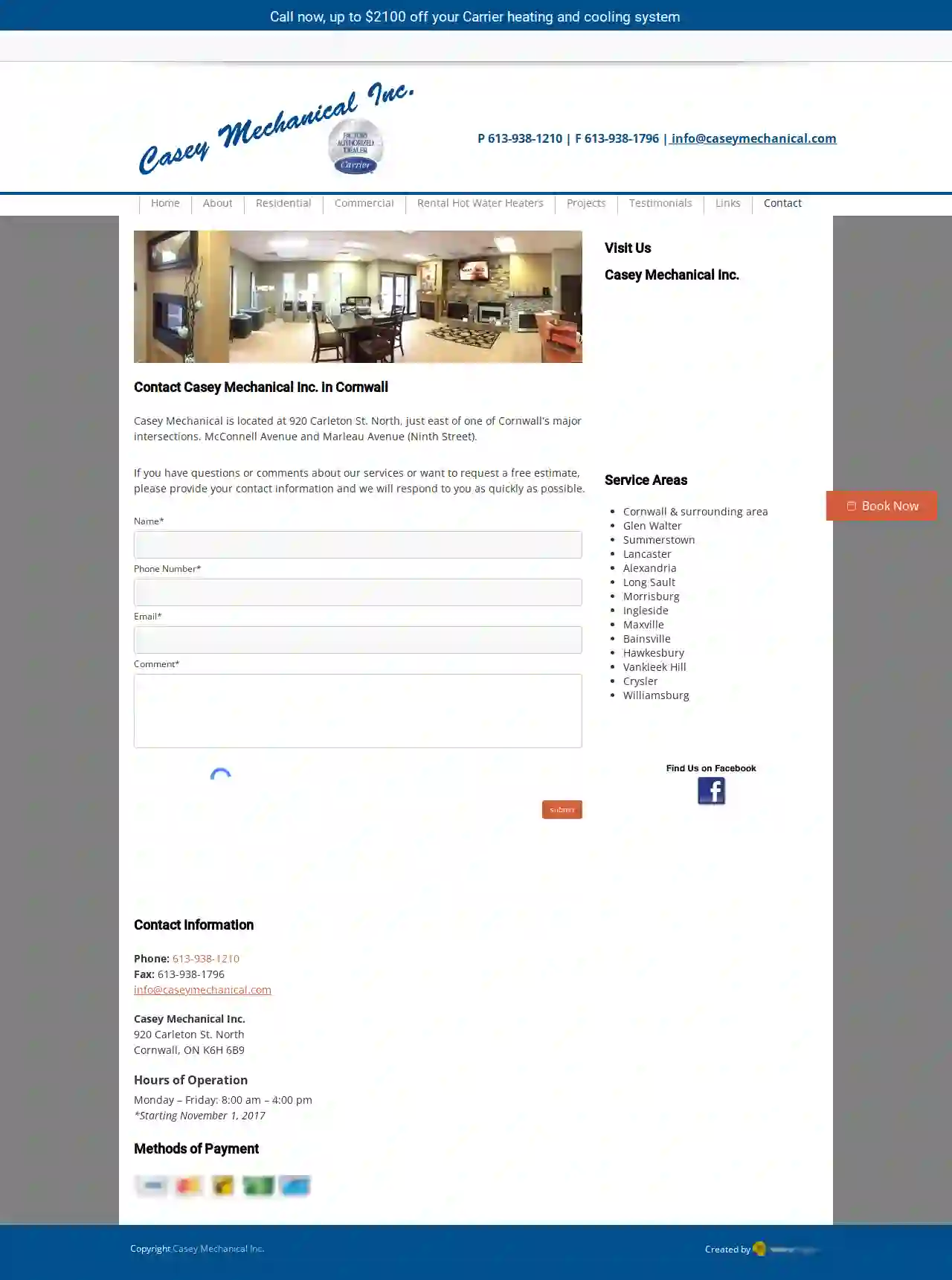
Casey Mechanical Inc
4.985 reviews920 Carleton St. North, Cornwall, K6H 6B9, GBCasey Mechanical is a trusted name in Cornwall for all your heating and cooling needs. Located at 920 Carleton St. North, just east of McConnell Avenue and Marleau Avenue (Ninth Street), we've been serving the Cornwall and surrounding area for years. Our team of experienced technicians is dedicated to providing top-notch service and ensuring your comfort year-round. Whether you need a new system installation, repairs, or regular maintenance, Casey Mechanical is here to help. We offer a wide range of services, including: Heating System Installation and Repair Cooling System Installation and Repair Rental Hot Water Heaters Free Estimates We are committed to providing our customers with the highest quality service and products at competitive prices. Contact us today to schedule a consultation and learn more about how we can help keep your home comfortable.
- Services
- Why Us?
- Gallery
Get Quote
The HVAC Service
4.727 reviewsOakville, L6J, GBSolving Challenges with Ease: Your Experienced HVAC Contractor in Oakville Dealing with HVAC troubles can be exhausting. That’s why having a reliable HVAC contractor by your side is a game-changer. When it comes to keeping your home comfortable, a dependable HVAC contractor in Oakville is a must-have on your contact list. At HVAC Service Solutions, we understand the importance of hassle-free heating and air conditioning in Oakville. We’ve got all your needs, from buying and rental to repair, maintenance, and installation. Trust us to handle your HVAC needs, so you can enjoy a comfortable and stress-free home.
- Services
- Why Us?
- Gallery
Get Quote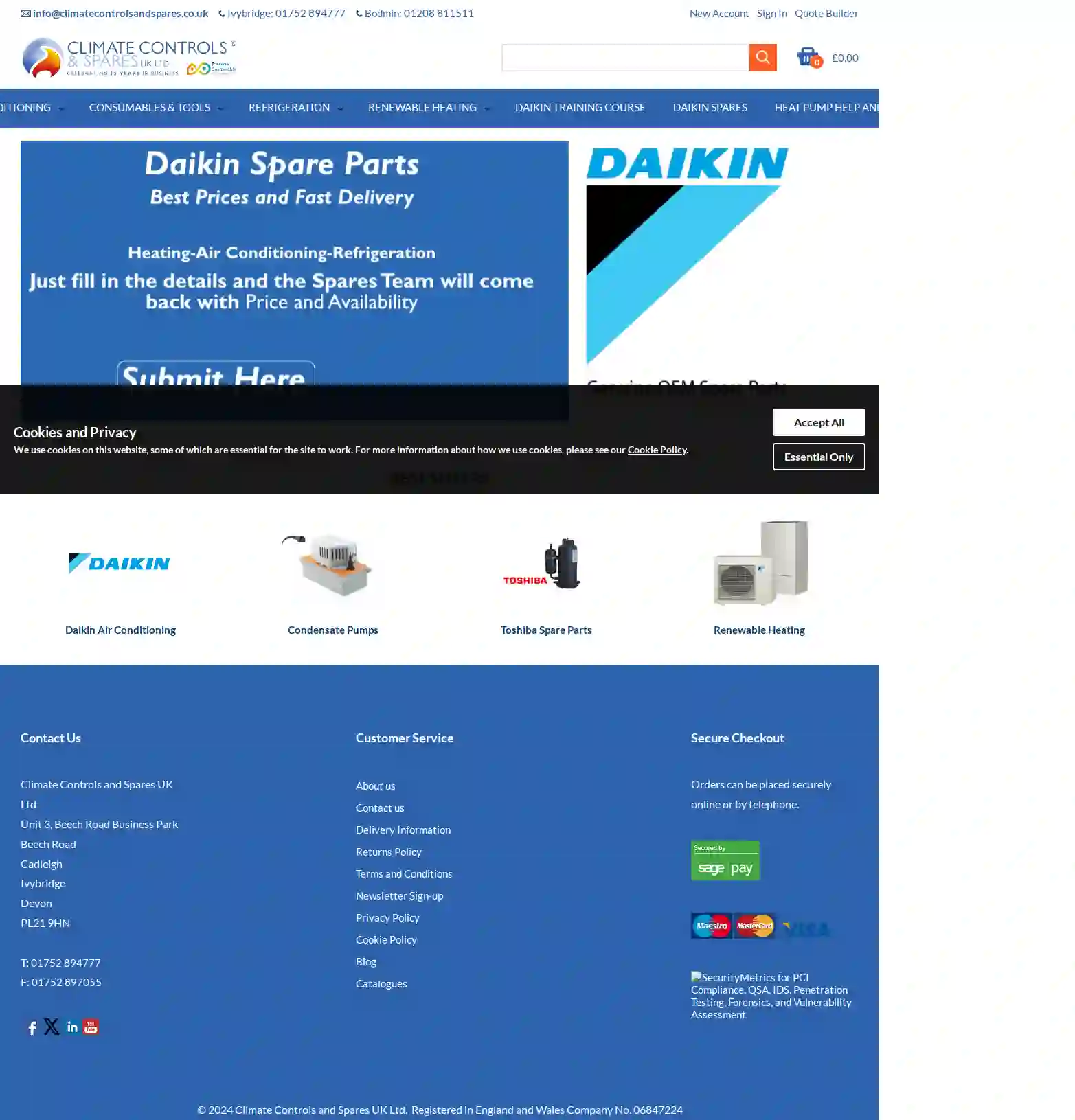
Climate Controls and Spares Bodmin
51 reviewsBeech Road, Unit 1-4, Beech Road Business Park, Ivybridge, PL21 9HN, GBClimate Controls and Spares Ltd is an independent Heating, Refrigeration and Air Conditioning National Distributor based in Plymouth, Devon. Established in 2009, we pride ourselves on offering a wide range of Air Conditioning Units, Inverters, Boiler and Refrigeration spare parts and equipment. As distributors for top brands like Daikin Air Conditioning, Hubbard Refrigeration, Firebird Boiler Spare Parts, and Maxkold Refrigeration, we provide excellent service and competitive prices. With fully stocked branches in Plymouth, Devon, and Bodmin, Cornwall, we ensure quick delivery across the UK and Europe. Most orders arrive the next day, and European orders within 5 working days. If you can't find the specific spare part you need on our website, please contact our Sales Line at 01752 894777, and we'll source it for you. We offer a complete solution for Air Conditioning, Boiler, and Refrigeration spares, encompassing both online purchasing and expert consultation on Air Con installations anywhere in the UK. Climate Controls and Spares UK Ltd has grown to become a leading supplier and distributor of high-quality Air Conditioning Units, Boiler Spares, and Refrigeration in the UK, providing year-round climate solutions.
- Services
- Why Us?
- Accreditations
- Our Team
- Testimonials
- Gallery
Get Quote
Over 12,692+ HVAC Companies registered
Our HVAC experts operate in Newlyn & beyond!
HVACCompaniesHub has curated and vetted the Best HVAC Companies near Newlyn. Find a reliable contractor today.
Frequently Asked Questions About HVAC Companies
- Frequent Repairs: If your system requires repairs often, it may be more cost-effective to replace it.
- Age of System: HVAC systems typically last 15-20 years. If your system is nearing or beyond that age, it's likely less efficient and more prone to breakdowns.
- Increased Energy Bills: A significant rise in energy bills could indicate your system is losing efficiency and needs replacement.
- Uneven Temperatures: If some rooms are too hot or too cold, it could be a sign of an inefficient HVAC system.
- Poor Indoor Air Quality: If you're experiencing allergies, dust, or other indoor air quality issues, a new HVAC system with better filtration could help.
- Strange Noises or Smells: Unusual noises or foul odors emanating from your HVAC system could signal a problem that requires a system replacement.
- What is the source of the problem? Get a clear explanation of the issue and what caused it.
- What are my repair options? Discuss different repair solutions, if applicable, and their associated costs.
- Are there any preventative measures I can take? Find out if there are steps you can take to prevent future problems.
- Do you recommend a repair or replacement? If repairs are extensive or the system is old, consider replacement.
- What are the warranties on parts and labor? Understand the warranties before agreeing to any repairs.
- Do you have any customer reviews or testimonials I can check? Reputable HVAC technicians are often happy to provide references or direct you to customer reviews.
What is the difference between an AC unit and a heat pump?
What are the signs that I need a new HVAC system?
How often should I have my HVAC system serviced?
What should I ask an HVAC technician during a service call?
What is the difference between an AC unit and a heat pump?
What are the signs that I need a new HVAC system?
- Frequent Repairs: If your system requires repairs frequently, it may be more cost-effective to replace it.
- Age of System: HVAC systems typically last 15-20 years. If your system is nearing or beyond that age, it's likely less efficient and more prone to breakdowns.
- Increased Energy Bills: A significant rise in energy bills could indicate your system is losing efficiency and needs replacement.
- Uneven Temperatures: If some rooms are too hot or too cold, it could be a sign of ductwork problems or an undersized/aging system.
- Poor Indoor Air Quality: If you're experiencing allergies, dust, or other indoor air quality issues, a new HVAC system with better filtration could help.
- Strange Noises or Smells: Unusual noises or foul odors emanating from your HVAC system could signal a problem that requires a system replacement.
How often should I have my HVAC system serviced?
What should I ask an HVAC technician during a service call?
- What is the source of the problem? Get a clear explanation of the issue and what caused it.
- What are my repair options? Discuss different repair solutions, if applicable, and their associated costs.
- Are there any preventative measures I can take? Find out if there are steps you can take to prevent future problems.
- Do you recommend a repair or replacement? If repairs are extensive or the system is old, consider replacement.
- What are the warranties on parts and labor? Understand the warranties before agreeing to any repairs.
- Do you have any customer reviews or testimonials I can check? Reputable HVAC technicians are often happy to provide references or direct you to customer reviews.